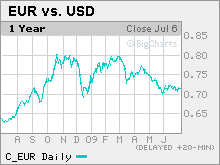Dollar strengthens ahead of earnings
Risk aversion and political instability in China send investors to the safe-haven of the greenback and yen.
NEW YORK (Reuters) -- The yen soared broadly in its biggest jump in months Wednesday as renewed concerns about the global economy prompted investors to undo bets against the Japanese currency.
Concerns about a recovery resurfaced with political turbulence in China led investors to question whether Chinese economic growth will be a driver of the global economy.
Gains in the yen multiplied after it broke through key technical levels, traders said. Investors then reversed trades where they had borrowed in yen to buy higher-yielding currencies.
"It's a risk-driven market and risk is in the process of being unwound," said Brian Dolan, chief currency strategist at Forex.com in Bedminster, N. J.
"That's hitting the yen crosses and carry trades are under significant pressure," he added. "Most of the selling so far of those yen crosses has been absorbed by dollar/yen."
In early afternoon trading in New York, the dollar slid 2.5% to 92.46 yen, having hit 91.82 yen, its lowest since February.
The euro dropped 3% to 127.97 yen, after hitting 127.05 yen, its lowest since May, according to Reuters data.
At current prices, it was the biggest one-day move in the euro against the yen since November and the biggest one-day move by the dollar against the yen since March.
Risk aversion also bolstered the dollar, adding momentum after leaders of the Group of Eight major economies did not discuss the dollar's role as the key global currency at Wednesday talks on the economy.
News that Chinese President Hu Jintao, who was due to attend the summit in Italy, was returning home to deal with unrest in the western region of Xinjiang had already dampened speculation that any currency comment would be added.
China had been one of the most vocal governments in seeking to discuss an alternative international currency to the U.S. dollar, but political turbulence in China has turned investors' attention elsewhere.
"Part of the optimism earlier about a worldwide recovery was based on the assumption that China would be this locomotive of growth and keep the rebound going," said Boris Schlossberg, director for currency research, at GFT Forex in New York.
"As the political situation in China becomes problematic, it provides another reason for investors to sell any high-yielding currencies, benefiting the dollar and the yen," he added.
The euro was down 0.6% at $1.3834.
Concerns about the second-quarter earnings season, which prepared to unofficially kick off after the bell on Wednesday, also weighed on sentiment, with investors worried that companies will have little good news to report.
Alcoa Inc., (AA, Fortune 500) the first Dow Jones industrials component to report quarterly earnings, is expected to post its third consecutive quarterly loss later on Wednesday.
The Australian dollar fell by 2.1% to $0.7726 and fell to its lowest level since mid May against the yen, shrugging off data earlier on Wednesday showing a surge in Australian consumer confidence. ![]()



